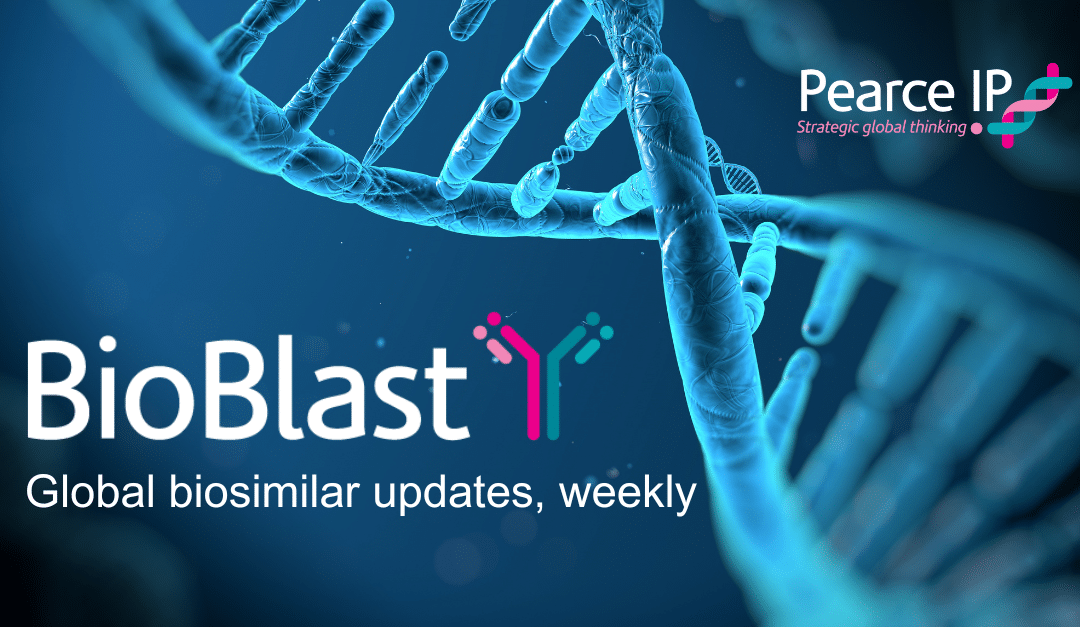The Nobel Assembly at Karolinska Institutet awarded the 2023 Nobel Prize in Physiology or Medicine jointly to Katalin Karikó and Drew Weissman for their discoveries concerning nucleoside base modifications that enabled the development of effective mRNA vaccines against COVID-19. Karikó and Weissman noticed that dendritic cells recognise in vitro transcribed mRNA as a foreign substance, which leads to their activation and the release of inflammatory signaling molecules. They produced different variants of mRNA, each with unique chemical alterations in their bases, which abolished the inflammatory response by the cells and paving the way for the use of mRNA as a therapy.
Recently on 11 September 2023, the FDA approved Pfizer & BioNTech’s 2023-2024 COVID-19 vaccine.
Biogen announced that the FDA has approved Tofidence®, its biosimilar to Roche’s Actemra®/ RoActemra® (tocilizumab) for treatment of moderately to severely active rheumatoid arthritis, polyarticular juvenile idiopathic arthritis and systemic juvenile idiopathic arthritis. Tofidence® is the first FDA approved tocilizumab biosimilar.
On 19 September 2023, the European Commission approved Fresenius Kabi’s Tyenne®, also a biosimilar to Roche’s Actemra® / RoActemra®, which is the first EU approved biosimilar to tocilizumab.
Outlook Therapeutics announced that it requested a Type A meeting with the FDA to discuss its Complete Response Letter (CRL) regarding its BLA for ONS-5010, the first ophthalmic formulation of bevacizumab, marketed by Genentech as Avastin®. In the CRL dated 30 August 2023, the FDA acknowledged the NORSE TWO pivotal trial met their safety and efficacy endpoints, but suggested the BLA could not be approved due to several chemistry, manufacturing and control issues, as well as open observations from pre-approval manufacturing inspections and a lack of substantial evidence.
Formycon and its commercialisation partner Fresenius Kabi announced that the EMA has accepted for review their MAA for FYB202, biosimilar to Johnson & Johnson’s Stelara® (ustekinumab).
In February 2023, Fresenius Kabi and Formycon AG announced they had reached a global to commercialise FYB202. Under the agreement, Fresenius has exclusive commercialisation rights in key global markets, whilst Formycon is responsible for development and registration. Formycon acquired the rights to FYB202 from Athos in May 2022.
Coherus Biosciences announced that the FDA issued a Complete Response Letter (CRL) for its BLA for Udenyca® OnBody™, Coherus’ on-body injector presentation of Udenyca®, biosimilar to Amgen’s Neulasta® (pegfilgrastim). The letter relates to an ongoing review of inspection findings at a third-party filler. The FDA did not identify issues with clinical efficacy or safety, trial design, labeling, drug substance manufacturing, or device design or manufacturing.
Separately, on 8 September 2023, Coherus announced that it completed its acquisition of Surface Oncology, Inc., a clinical-stage immuno-oncology company.
Sandoz and Polpharma Biologics announced that the EC has approved Tyruko® (natalizumab), biosimilar to Biogen’s Tysabri®, as a single disease-modifying therapy (DMT) in adults with highly active Relapsing Remitting Multiple Sclerosis. This is the first EC approved biosimilar to Tysabri®. Tyruko® was developed by Polpharma Biologics, and will be commercialised by Sandoz.
Tyruko® was approved by the FDA on 25 August 2023. The EU CHMP issued a positive opinion recommending approval of Tyruko® on 21 July 2023.
Novartis confirmed its Sandoz generics and biosimilars business will spin-off, with trading of the new Sandoz Group AG to commence on 4 October 2023.
This follows the Novartis shareholder approval for the spin-off at its EGM on September 15 2023. The proposed spin-off was first announced by Novartis on 25 August 2022, a proposal which was unanimously endorsed by the Novartis board on 18 July 2023 with a target date of Q4/23.
KED Global reported that Celltrion Inc. will provide biosimilars worth ₩423.6B (US$323M) to its global sales and marketing affiliate Celltrion Healthcare Co., Celltrion’s largest supply deal. The supplies include Yuflyma® (adalimumab, biosimilar to AbbVie’s Humira®), Remsima® and Remsima SC® (infliximab “biobetter” to Janssen’s Remicade®), Truxima® (rituximab, biosimilar to Genentech/Biogen’s Rituxan®) Herzuma® (trastuzumab, biosimilar to Genentech’s Herceptin®), and Vegzelma® (bevacizumab, biosimilar to Genentech’s Avastin®).
On 18 September 2023, Celltrion won bids to supply Yuflyma® in five regions of Italy, and On 11 May 2023, Celltrion won bids to supply Vegzelma® (bevacizumab) in Italy and Belgium.
Eisai and Biogen announced that Leqembi® (lecanemab) intravenous infusion was approved in Japan for slowing progression of mild cognitive impairment and mild dementia due to Alzheimer’s disease (AD). On 21 August 2023, the Japanese Ministry of Health, Labour and Welfare committee recommended approval of Leqembi®.
Japan is the second country to grant approval of Leqembi®, following the traditional US FDA approval on 6 July 2023.
AbbVie announced that the EC granted conditional marketing authorisation for Tepkinly® (epcoritamab) as a monotherapy for the treatment of adult patients with relapsed or refractory (R/R) diffuse large B-cell lymphoma (DLBCL) after two or more lines of systemic therapy.
Tepkinly® was co-developed by AbbVie and Genmab, and the companies share commercial responsibilities in the US and Japan. AbbVie is responsible for further global commercialization and will continue to pursue regulatory submissions for the drug in international markets throughout 2023.
Alvotech announced that Fuji Pharma, its commercialisation partner in Japan, has received marketing approval for AVT04 (ustekinumab), a biosimilar to Janssen’s Stelara®, from the Japanese Ministry of Health, Labor and Welfare. Alvotech reported that, based on publicly available information this is the first ustekinumab biosimilar approved in Japan, and is also the first biosimilar approved under its agreement with Fuji which covers the commercialisation of seven biosimilars in total in Japan.
Alvotech and Fuji Pharma announced their exclusive agreement for the commercialisation of a Stelara® biosimilar in Japan in April 2019.

Naomi Pearce
CEO, Executive Lawyer (AU, NZ), Patent Attorney (AU, NZ) & Trade Mark Attorney (AU)
Naomi is the founder of Pearce IP, and is one of Australia’s leading IP practitioners. Naomi is a market leading, strategic, commercially astute, patent lawyer, patent attorney and trade mark attorney, with over 25 years’ experience, and a background in molecular biology/biochemistry. Ranked in virtually every notable legal directory, highly regarded by peers and clients, with a background in molecular biology, Naomi is renown for her successful and elegant IP/legal strategies.
Among other awards, Naomi is ranked in Chambers, IAM Patent 1000, IAM Strategy 300, is a MIP “Patent Star”, and is recognised as a WIPR Leader for patents and trade marks. Naomi is the 2023 Lawyers Weekly “IP Partner of the Year”, the 2022 Lexology client choice award recipient for Life Sciences, the 2022 Asia Pacific Women in Business Law “Patent Lawyer of the Year” and the 2021 Lawyers Weekly Women in Law SME “Partner of the Year”. Naomi is the founder of Pearce IP, which commenced in 2017 and won 2021 “IP Team of the Year” at the Australian Law Awards.

Sian Hope
Lawyer
Sian is a life sciences focussed intellectual property lawyer with a particular focus on the pharmaceutical, biotechnology and healthcare industries. Her practice is primarily in patent litigation, but includes non-contentious patent matters, trade mark matters, health regulatory legal matters and consumer law.

